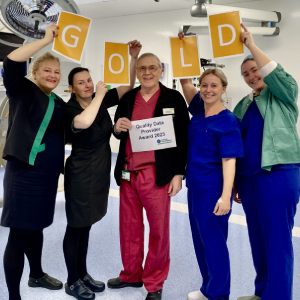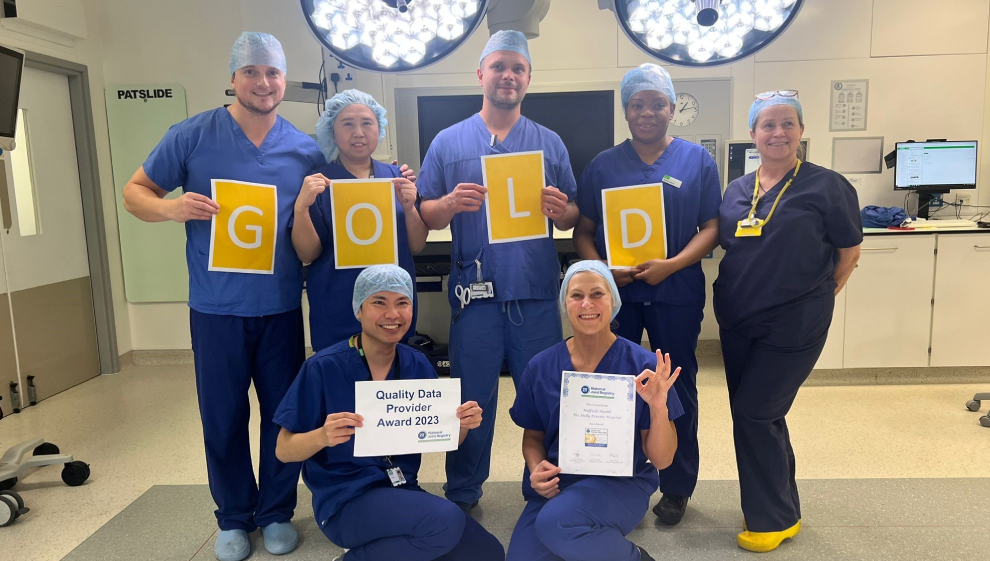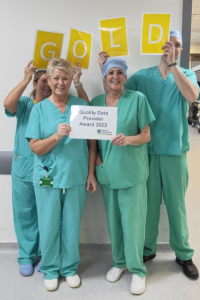Nuffield Health hospitals across England and Wales achieve ‘gold’ standard awards from the National Joint Registry for their commitment to patient safety
- Overview

The National Joint Registry monitors the performance of hip, knee, ankle, elbow and shoulder joint replacement procedures to improve clinical outcomes for the benefit of patients, but also to support and give performance feedback to orthopaedic clinicians and industry manufacturers.
The ‘NJR Quality Data Provider’ certificate scheme is available to NHS and independent sector hospitals in England and Wales. It was introduced to offer hospitals a blueprint for reaching high quality standards relating to patient safety and to reward orthopaedic surgery services who have met registry targets.
The ‘Gold’ awards mean that 34 of Nuffield Health hospitals in England and Wales have met a 100% NJR target for sharing data to improve clinical outcomes for the benefit of patients.
Caroline Smith, Nuffield Health’s Chief Quality and Operations Officer, says:
“This is a fantastic achievement for our teams at 34 of our hospitals in England and Wales, rewarding our hard-working clinical teams and non-clinical administrative staff that inputted over 20,000 records for the National Joint Registry.
“People who choose to have their joint care with a Nuffield Health hospital benefit from an experienced and expert clinical team, as recognised by the National Joint Registry, but also receive connected physiotherapy and specialist rehabilitation care. We are also investing in new technologies to support clinical decision-making, with the clear end-goal of improving clinical outcomes for the benefit of more people in local communities.”
Nuffield Health The Holly Hospital’s orthopaedics and theatres team

The ‘NJR Quality Data Provider’ scheme was devised to offer all orthopaedic service providers in the NHS and independent sector public recognition.
To achieve an award, providers are required to meet a series of six ambitious targets during the audit period 2022/23. One of the targets is compliance with the NJR’s mandatory national audit aimed at assessing data completeness and quality within the registry.
From the 2022/23 audit year onwards, a new three-tier, gold, silver and bronze awarding system has been applied to the scheme to further encourage all hospitals to strive to achieve the most excellent data quality standard. A ‘Gold’ award means the provider has met 100% of the data quality requirements.
Mr Tim Wilton, National Joint Registry Medical Director, says:

“Congratulations to Nuffield Health’s hospitals and their clinical teams for their ‘Gold’ awards. The Quality Data Provider Award demonstrates the high standards being met towards ensuring compliance with the NJR and is often a reflection of strong departmental efforts to achieve such status.
“As well as being a fundamental driver to inform improved quality of care for patients, registry data provides an important source of evidence for regulators, such as the Care Quality Commission, to inform their judgements about the quality of health services.”
Full details about the NJR’s Quality Data Provider certificate scheme can be found online at: https://www.njrcentre.org.uk.
Notes to editors
* The 34 Nuffield Health hospitals receiving the NJR ‘Gold’ award are Nuffield Health at St Bartholomew’s Hospital, Bournemouth, Brentwood, Brighton, Bristol, Cambridge, Cheltenham, Chichester, Derby, Exeter, Guildford, Haywards Heath, Hereford, Highgate, The Holly, Ipswich, Leeds Hospital, Leicester, Newcastle-upon-Tyne, North Staffordshire, Cardiff & Vale hospitals, Parkside, Plymouth, Shrewsbury Hospital, Taunton, Tees Hospital, The Grosvenor (Chester), The Manor (Oxford), Tunbridge Wells, Warwickshire, Wessex, Woking, Wolverhampton and York.
Nuffield Health has 37 hospitals across the UK, however hospitals in Scotland do not contribute to the National Joint Registry, which only collects data from England and Wales. Additionally, Nuffield Health Cancer Centre London focuses on cancer care and does not have an orthopaedic service
Last updated Monday 8 January 2024
First published on Monday 8 January 2024
